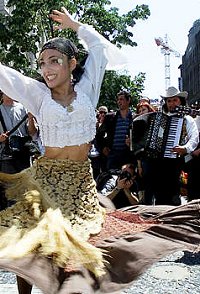Eremetic
Neo Luddite • Unknown
-
- Joined
- Oct 25, 2023
- Posts
- 3,780
Legend has it that European Gypsies came from Egypt but a new genetic study has shown they came from a small population that emerged from ancestors in India around 1000 years ago.
The research, by Professor Luba Kalaydjieva of the University of Western Australia and team, looked at the origins of eight to 10 million people in Europe commonly known as Gypsies.
Roma, Romani or Romany are other names for this community, which has featured in movies such as Latcho Drom.
"[The research] is the best evidence yet of the Indian origins of the Gypsies," the researchers write in an article published online ahead of print in the American Journal of Human Genetics.
The researchers were first alerted to the idea that the Romany may be descended from a small founder population when they discovered that certain genetic mutations in the population were shared in people who were not directly related.
This occurs in other groups that have developed from small founder populations such as the Finns, Ashkenazi Jews, the population of Quebec in Canada and possibly the Australian island state of Tasmania, Kalaydjieva, told ABC Science Online.
Kalaydjieva and team have been studying the genetics of Romany people for over 10 years.
In this recent study, which will be published in the October issue of the journal, the researchers analysed five genetic mutations linked to certain diseases, such as the neuromuscular disorder myasthenia.
The aim was to try and estimate when the original founder population arose and when it split off into different groups of Romany.
The researchers studied the diversity of the chromosomes that carry the genetic markers. Over successive generations, the region around the genetic markers become more and more diverse.
By applying a known rate of genetic change in DNA, the researchers worked out the founder population emerged from the ancestral population 32 to 40 generations ago, or 800 to 1000 years ago.
An Indian origin
As well as looking at over 1100 samples of Romany from Europe, they studied six samples from India and found that the similarity in genetic markers supported the theory that the founder group, of perhaps under 1000 people, came from India.
The idea that Romany people came from India was first proposed 200 years ago based on similarities between their language and the Indian language Sanskrit, said Kalaydjieva. But such studies were inconclusive.
"There are quite a few examples where a population adopts a language but this does not necessarily mean its biological roots belong to the same place as the larger population that speaks this language," she said.
"So from the biological point of view we have provided we have provided the best evidence so far that this is indeed a population that derives from the Indian subcontinent."
Kalaydjieva and team's analysis of disease genetic markers supported the scientists' previous research on male and female genetic markers.
"It all points in the same direction," she said.
Kalaydjieva said scientists commonly used the term "Gypsy" but this was politically and historically loaded.
"Initially Gypsies were called Gypsies because Europeans believed, and this was a legend that the Gypsies maintained themselves, that they came from Egypt," she said.
But she said Gypsies had been persecuted due to superstition, racism and prejudice. The term Gypsy had become increasingly given a pejorative meaning, being used to describe a social category with a wandering nomadic way of life, rather than a biological population. Many people from that group now preferred to be called Roma, Romani or Romany.
She said the term Romani or Romany, strictly speaking linguistically and historically, described Balkan Gypsies. These people were a sub-group of European Gypsies and the scientific term Gypsy was a more generic term to cover the biological population.
Today people descended from European Gypsies live all over the world, even Australia. In Bulgaria alone there are at least 50 groups with different traditions, cultures, dialects and adopted religions
The research, by Professor Luba Kalaydjieva of the University of Western Australia and team, looked at the origins of eight to 10 million people in Europe commonly known as Gypsies.
Roma, Romani or Romany are other names for this community, which has featured in movies such as Latcho Drom.
"[The research] is the best evidence yet of the Indian origins of the Gypsies," the researchers write in an article published online ahead of print in the American Journal of Human Genetics.
The researchers were first alerted to the idea that the Romany may be descended from a small founder population when they discovered that certain genetic mutations in the population were shared in people who were not directly related.
This occurs in other groups that have developed from small founder populations such as the Finns, Ashkenazi Jews, the population of Quebec in Canada and possibly the Australian island state of Tasmania, Kalaydjieva, told ABC Science Online.
Kalaydjieva and team have been studying the genetics of Romany people for over 10 years.
In this recent study, which will be published in the October issue of the journal, the researchers analysed five genetic mutations linked to certain diseases, such as the neuromuscular disorder myasthenia.
The aim was to try and estimate when the original founder population arose and when it split off into different groups of Romany.
The researchers studied the diversity of the chromosomes that carry the genetic markers. Over successive generations, the region around the genetic markers become more and more diverse.
By applying a known rate of genetic change in DNA, the researchers worked out the founder population emerged from the ancestral population 32 to 40 generations ago, or 800 to 1000 years ago.
An Indian origin

|
As well as looking at over 1100 samples of Romany from Europe, they studied six samples from India and found that the similarity in genetic markers supported the theory that the founder group, of perhaps under 1000 people, came from India.
The idea that Romany people came from India was first proposed 200 years ago based on similarities between their language and the Indian language Sanskrit, said Kalaydjieva. But such studies were inconclusive.
"There are quite a few examples where a population adopts a language but this does not necessarily mean its biological roots belong to the same place as the larger population that speaks this language," she said.
"So from the biological point of view we have provided we have provided the best evidence so far that this is indeed a population that derives from the Indian subcontinent."
Kalaydjieva and team's analysis of disease genetic markers supported the scientists' previous research on male and female genetic markers.
"It all points in the same direction," she said.
Kalaydjieva said scientists commonly used the term "Gypsy" but this was politically and historically loaded.
"Initially Gypsies were called Gypsies because Europeans believed, and this was a legend that the Gypsies maintained themselves, that they came from Egypt," she said.
But she said Gypsies had been persecuted due to superstition, racism and prejudice. The term Gypsy had become increasingly given a pejorative meaning, being used to describe a social category with a wandering nomadic way of life, rather than a biological population. Many people from that group now preferred to be called Roma, Romani or Romany.
She said the term Romani or Romany, strictly speaking linguistically and historically, described Balkan Gypsies. These people were a sub-group of European Gypsies and the scientific term Gypsy was a more generic term to cover the biological population.
Today people descended from European Gypsies live all over the world, even Australia. In Bulgaria alone there are at least 50 groups with different traditions, cultures, dialects and adopted religions






